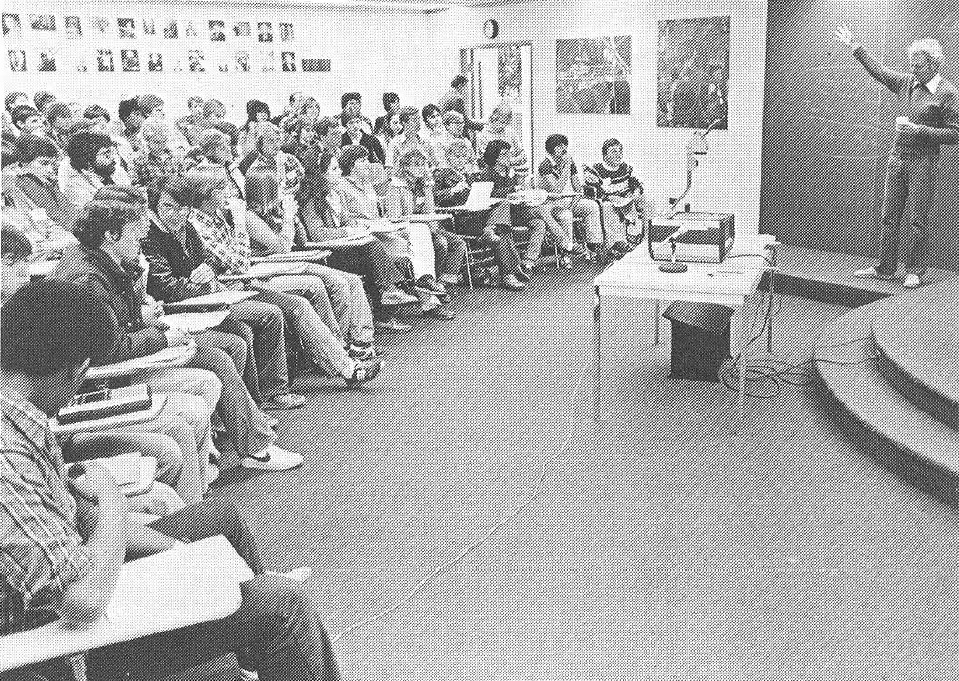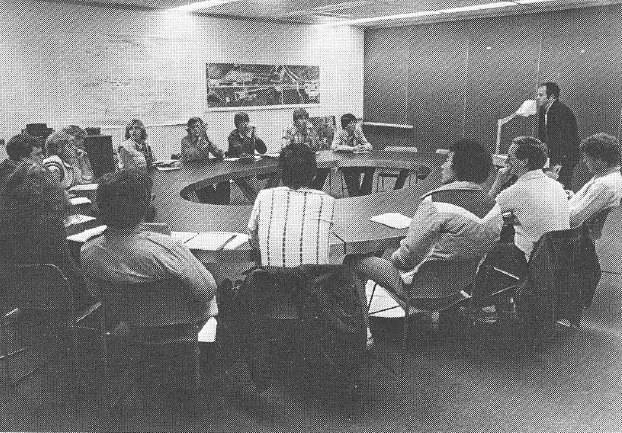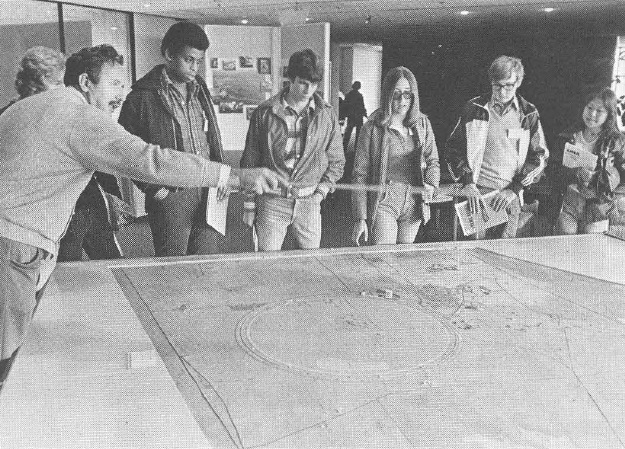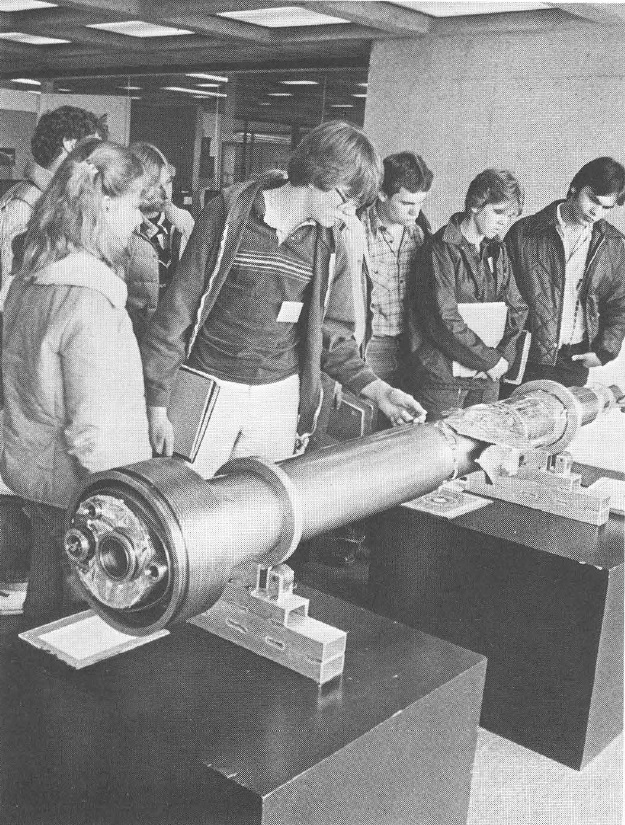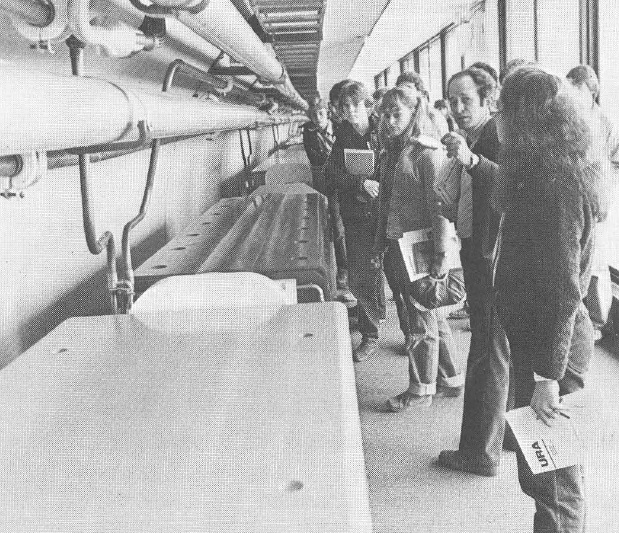Talented High School Students Learn About High Energy Physics at Fermilab
Fermilab is conducting a Saturday Morning Physics Program for gifted high school upper classmen who are interested in science. A group of 240 young men and women were selected as the best three or four science-oriented students in each of seventy high schools in the vicinity of the Laboratory. The program is offered at no charge as a way of maintaining and enhancing the interest of young students in science.
For 10 consecutive Saturday mornings, 80 students and instructors come to the Laboratory to attend lectures and take tours led by volunteer Fermilab scientists and engineers - men and women actively working at the frontiers in experimental and theoretical high energy physics. The students tour Fermilab's accelerator facilities and experimental areas. All in all, they spend up to three hours each Saturday morning learning about the frontiers of particle physics from the very scientists who are taming those challenging regions. One recent Saturday, the youths met Dr. James W. Cronin, University of Chicago, who shares the 1980 Nobel Prize in physics.
Three 10-week sessions are scheduled throughout the year, beginning Oct.4, 1980, Jan. 10 and March 21, 1981. The subjects are carefully selected to give the students the broadest possible view of high energy physics, yet tuned to their level of understanding.
John McCook is coordinating the program. He is assisted by Mrs. Yvonne Richter, a physics teacher at Batavia High School.
In asking the high school educators to select the students for this program, Dr. Leon Lederman, Fermilab director, described the purpose of Saturday Morning Physics as a determined effort "to further the understanding and appreciation of modern physics among high school upper classmen with strong interests in mathematics, physics, chemistry and science in general."
The series of lectures is given by Fermilab scientists on a volunteer basis. However, the lively and provocative interest of students has so stimulated the lecturers that there is a keen competition for the prize of enthralling the students with the lectures.
Dr. Lederman, in his opening lecture, stressed the importance of science to a troubled world inescapably dependent on an ever more effective technology.
The loss of a single young person due to indifferent teaching or an unreceptive environment could result in the loss of the mind capable of finding the cure for cancer or a solution to the energy crisis. The world can ill afford to wait for another 30 to 50 years for another chance. Professor Cronin, in his remarks to the students, noted that high school is of ten the crucial experience that sets the course for the future career of scientists.
Saturday Morning Physics at Fermilab is designed to address these problems by the exposure of high school science students to the exciting realm of frontier research.
Saturday Morning Physics Curriculum
The subjects for each of the 10 classes in the order they will be given are:
Week 1 - Introduction. What is an elementary particle: from molecules to quarks with a pause at the hydrogen atom.
2 - Special theory of relativity.
3 - How do we see particles? Interactions of radiation with matter. Detectors.
4 - Conservation laws and symmetry principles: energy, momentum, rotation, left-handedness and right-handedness, time and antimatter.
5 - Quantum theory, particles and waves, quantum numbers and the intrinsic properties of elementary particles, such as charge, spin, mass, strangeness and others.
6 - How do we make particles? Accelerators, beam transport and assorted technologies.
7 - Leptons and quarks: electrons, muons, taus and neutrinos of the lepton world; mesons and baryons and their constituents. The quark model.
8 - The forces of nature and their carriers: photons, W particles and gluons.
9 - The connections of particles with cosmology. How the world began. Massive neutrinos, pulsars, neutron stars and black holes.
10 - Particle physics spin offs. Technology and application to other fields. Current problems and future projections.
Instructors for Saturday Morning Physics
In addition to Leon Lederman, other main lecturers include James Bjorken, Charles Brown, Frank Cole, Mark Fischler, Irwin Gaines, Christopher Hill, Ernest Malamud, Chris Quigg and Alvin Tollestrup.
Volunteering to serve as associate lecturers for this first 10-week session are H. Barton, J. Butler, R. Carrigan, F.Cole, B. Cox, C. Curtis, M. Fischler, G. Fisk, P. Garbincius, D. Green, C. Hojvat, D. Jovanovic, J. Lach, E. Malamud, L. Michelotti, T. Murphy, S.Pordes, P. Rapidis, P. Rapp, L. Teng, L. Voyvodic and J. Walker.
